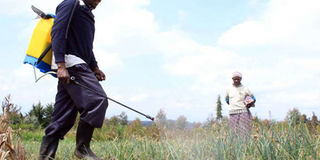It’s time to rethink the use of herbicides

John Mbaria sprays his onion farm in Endarasha, Nyeri County, with a herbicide on June 29, 2016. In Kenya, farmers perceive the use of herbicides and other pesticides not as problematic. PHOTO | JOSEPH KANYI | NATION MEDIA GROUP
What you need to know:
- In Kenya, there is no programme to gather information on glyphosate pollution in water, soil and air, or residue monitoring in food.
- Covering soil with mulch and cover cropping with legumes, which fix nitrogen from the air, help to improve soil fertility.
The use of herbicides and pesticides in developing countries, mostly as a perennial and annual weeds control measure, is widespread.
The most heavily used herbicide is glyphosate because it requires less field preparation and fewer expenses linked to farm machinery.
In 2011, nearly 650,000 tonnes of glyphosate products were used worldwide and this was expected to double by this year.
In Kenya, although there is no publicly available data, there are 28 different glyphosate-based products.
They are applied in tea and coffee plantations, beans, sugarcane, barley, and maize.
HUMAN HEALTH
Despite the economic and ecological benefits such as soil erosion prevention, organic matter loss, water evaporation and biodiversity, there is a need to question the effects of the use of herbicides on human health and the environment.
In Europe, there has been heated debate between scientists, NGOs, governments and industry in the past two years on the re-registration of this active ingredient.
Some argue that glyphosate is likely to cause cancer and should, therefore, not be re-registered.
It is an argument that has been supported by the International Agency for Research on Cancer.
FARMERS
Others argue that the carcinogenic properties have not been proven conclusively and that glyphosate should thus be re-registered.
Unfortunately, glyphosate was on November 27 reregistered for the next five years.
In Kenya, farmers perceive the use of herbicides and other pesticides not as problematic.
It’s a perception that is mainly attributed to lack of awareness.
And where training is given to farmers, the emphasis is on personal health protection equipment.
POLLUTION
Monitoring programmes in Europe and the US show ecotoxicological relevant glyphosate concentrations in water, urine and food (for beer and bread), so one can expect elevated concentrations in developing countries.
In Kenya, there is no programme to gather information on glyphosate pollution in water, soil and air, or residue monitoring in food.
A paper by Rockström in 2009 stated that one of the biggest environmental problems is pollution.
This argument was reemphasised at the just-concluded United Nations Environment Assembly in Nairobi.
MAIZE
Another issue is the calculation of Maximum Residue Levels (MRLs) in food.
Very often, the European MRLs are taken as a guide and simply adopted for Kenya due to the need for compliance for the export market.
However, situations might be very different. The European MRL of glyphosate allowed in maize is 1 mg/kg.
One of the basic assumptions is the average amount of maize an average European eats per day.
However, the amount eaten by a Kenyan in a day is certainly higher.
This means that the allowed MRL needs to be adapted to Kenyan eating habits and might have to be reduced.
SOIL FERTILITY
Examples in Kenya, such as the organic coffee project in Rongo supported by Permaculture Research Institute and Biovision, proves that it is possible to reduce the use of glyphosate without any negative economic effects.
After two years of changing to organic coffee production, the yield increased from less than 0.5 to 2.4 kg per tree per harvest.
Covering soil with mulch and cover cropping with legumes, which fix nitrogen from the air, help to improve soil fertility.
Other possible solutions include intercropping with nitrogen fixers such as caliandra, lucerne, pigeon peas, agroforestry, spraying with a natural product such as vinegar and digging or pulling out weeds.
We should do this for the sake of food quality, our health and environment.
Dr Bollmohr, an environmental scientist, is the managing director of EcoTrac Consulting. [email protected]





